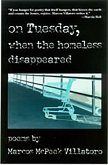Sharon Rose-Kourous's debut collection, Things Have Disappeared, journeys through the fields of nature, memory, and overlooked routine moments. With elegant formal mastery and vivid imagery, Rose-Kourous artfully transforms the mundane into realms of insight and profound feeling. Poems like "A Somehow Lilac" and "Self-Portrait" showcase her keen observation and emotional depth as she explores family, loss, and the passage of time. Musicality and rich language shine through in pieces such as "Snowfall," "Silence," and "Nodding Off," where Rose-Kourous examines familiar subjects from surprising and thoughtful perspectives. This memorable collection demonstrates not only her fine craftmanship but also her understanding of the natural world and the complexities of human experience. Things Have Disappeared is an unforgettable invitation to unravel the beauty and wisdom hidden in the details of everyday life. -Alexander Pepple, editor, Able Muse In 1997 I co-founded Zeugma, an online poetry workshop of which Sharon Rose-Kourous was an early member. Later, as managing editor of The Melic Review, I published several of the poems herein. I was thus delighted and honored when Sharon asked me to review this collection. I am, as ever, astonished at Sharon's vividly intricate metaphors and effortless mastery of prosody. Her polished devices of form and play of language are apparent on every page. Among other favorites, "After-life" and "Leaving shine out," as well as "My Father Was a Carpenter," and the piercing elegy "Of Spring." Here are heart-deep metaphors so vivid in their immediacy that one cannot come away from reading and expect the world to look the same. These are the poems of a maturity tempered into wisdom; a wrestled acceptance that the yearning to know always ends in never knowing. I look forward eagerly to Sharon's forthcoming collection. -Kathleen Chaffin, editor, The Melic Review
Bitte wählen Sie Ihr Anliegen aus.
Rechnungen
Retourenschein anfordern
Bestellstatus
Storno


